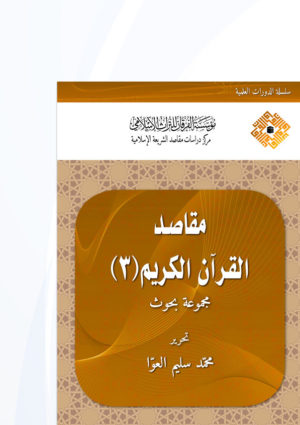The Centre for the Study of the Philosophy of Islamic Law (Maqāṣid Centre) at Al-Furqān Islamic Heritage Foundation (London), in collaboration with the Maqāṣid Research & Studies Centre (Rabat) and the Department of Islamic Studies, Faculty of Letters & Humanities Ben M'sik (Casablanca), organised the third training course on “The Objectives of the Noble Qurʾān”. The Course took place over three days, 9-11 May 2017 (12-14 Sha‘bān 1438), at Kenzi Hotel in Casablanca, Morocco.
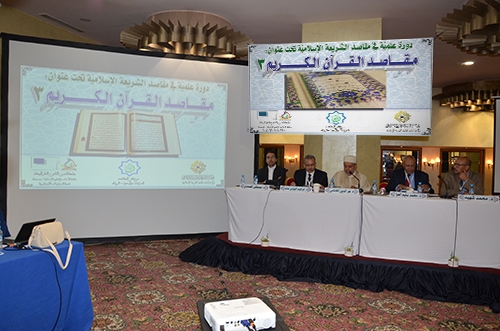
Dr Abdul Majid al-Najjar chaired the inaugural session, which began with a recitation from the Noble Qurʾān. Mr Sali Shahsivari, Managing Director of Al-Furqān Foundation, then thanked participants and organisers. He emphasised that the Training Course had opened new horizons for research into the Noble Qurʾān’s objectives (maqāṣid) and had set about addressing areas not covered in the previous two training courses, with the ultimate aim to clearly map the Noble Qurʾān’s objectives. Abdelmalek Lakehayli, Vice-President of Casablanca Commune Council, praised the course topic, and talked about the Council’s priority of human before urban development. Subsequently, Professor Idris Mansuri, President of Université Hassan II Casablanca, reflected on the topic. He concluded that knowledge of Qurʾān objectives was a precursor to reflection and contemplation on God’s signs. In turn, Professor Abdelkader Gongai, Dean of the Faculty of Letters & Humanities Ben M'sik welcomed the participants and lecturers, and commended the areas covered by the papers. Professor Mohamed Salim El-Awa then spoke on behalf of the participants, followed by Professor al-Hussain al-Mous, Vice-Director of the Maqāṣid Research & Studies Centre. A speech by Professor Khalid Samadi, Secretary of State to the Minister of National Education, Vocational Training, Higher Education and Scientific Research concluded the inaugural session. Professor Samadi highlighted the need to update research curricula, secure integration among universities, and engage in university reform and integration of knowledge domains. Education and Scientific Research concluded the inaugural session. Professor Samadi highlighted the need to update research curricula, secure integration among universities, and engage in university reform and integration of knowledge domains.
Following these opening speeches, the Course sessions began. Professor Noureddine al-Khadimi chaired the first session, in which Professor Ibrahim Elbayoumi Ghanem delivered his paper, “One religion, the objective of multiple Divine Messages and global scope of Islam”. He stressed the unity of human beings by virtue of their common origin and shared ancestry and reflected upon the concept of Islam’s global scope. He emphasised the unity of religion and the objective of multiple Divine Messages. He then expanded on the concept of “religion”, citing scholars’ explanations and definitions. He made reference to the objective of multiple Divine Messages, including the incremental approach to the perfect unity of religion, and complete unity of humankind, but not ordinances. He then discussed Islam’s global scope, emphasising that brotherhood in humanity is the path to peace. However, he emphasised that this global scope did not imply coercing people to embrace Islam. Finally, he argued in favour of a new discourse espousing novel juristic effort (ijtihād) performed collectively in such matters, based on objectives grounded on the Qur’ān’s universalities (kulliyāt).
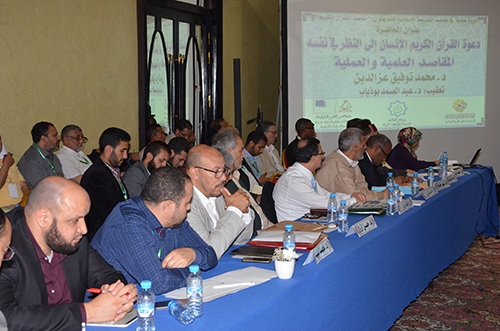
Professor Mohamed Salim El-Awa commented on this paper. He explained that the multiplicity of Divine Messages is one of the Qur’ān’s principal objectives. Moreover, Islam’s global scope is one of the objectives underlying the Prophet Muhammad’s mission. Professor El-Awa differentiated between the universality of religion and the global scope of Islam; the former refers to religion addressing all without distinction, and the latter is the address to everyone following Prophet Muhammad’s mission. Professor El-Awa also elaborated on the historical context in which Abdallah Draz and Mustafa Abdelraziq formulated their views regarding religion and Islam’s global scope. He concluded by saying that novel juristic effort, as an intellectual exercise, is open to revision in the light of changing times and places.
The session’s second paper related to “The Noble Qur’ān’s objectives in constituting the witness Ummah over mankind”. Dr Muhammad Shahid asserted that his paper combined both legal theory and intellectual dimensions. He approached the topic by focusing on the “first” and “last” verses revealed to deduce that Dr Muhammad Shahid asserted that his paper combined both legal theory and intellectual dimensions. He approached the topic by focusing on the “first” and “last” verses revealed to deduce the Qur’ān’s objectives. He clarified that in Surah al-‘Alaq (Qur’ān 96), the opening with “iqra’” urges learning and seeking knowledge. Furthermore, the first verses of Surah al-Muzzammil (Qur’ān 73) are an invitation to self-purification, while those of Surah al-Muddaththir (Qur’ān 74) discuss the proselytising (da‘wah) framework. Similarly, the first part of Surah al-Qalam (Qur’ān 68) is an invitation to adhere to ethics and model behaviours. From the first verses revealed, he extracted the objectives (maqāṣid) of building knowledge, spirituality, proselytising (da‘wah) capacities, and morality. On the other hand, from the last verses revealed, he extracted the following objectives: attention to the economic dimension; remoteness from monopoly and consumption and all things linked to a usury-based economy; connecting to God and adhering to His ordinances under all conditions; writing and recording; sanctity of blood and prohibition of murder; and so on. He then elucidated the characteristics of the Islamic discourse. These, he summarised in the following way: the human nature of this discourse with a focus on the holistic, comprehensive perspective that dominates over prior Divine Messages and humankind; also, consideration for consequences (al-ma’āl), by defining the jurisprudence of priorities (fiqh al-awlawiyyāt), centring on the human dimension. He emphasised that focusing on these characteristics will assist in the salvation of the contemporary human being, especially, given the devastation inflicted by modernism on mankind, the universe, and the environment.
Dr Moustafa al-Ṣamadi commented on this submission. He analysed the terms of the title, beginning with the Noble Qur’ān which indicates fixed words allied to mobility through time. In addition, objectives indicate the continuing creative juristic effort to extract the underlying meanings of words. He stopped at the witness Ummah, and asked: how can Muslims become witnesses over people? How could they present civilisational testimony over the world? He mentioned that achieving civilisational testimony requires self-knowledge, as seen through the lens of the Qur’ānic text, and knowledge of the self’s problems and issues. He asserted that today’s world is in crisis relating to knowledge and values. He also pointed to the necessity of giving due consideration to context and formulae in the Qur’ānic discourse to find solutions to contemporary crises. Moreover, the necessity to engage with the other, on the basis of shared values.
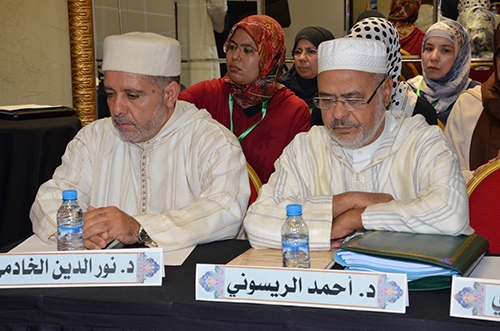
Interaction with the audience then ensued through questions, discussion points, commentary, and recommendations.
Professor Hussain al-Mous chaired the second session. The first paper, “The Noble Qur’ān’s objectives and their effects in constructing human commonalities”, was delivered by Dr Abdul Rahman al-Kaylani. He began by emphasising the human dimension residing in Islamic law objectives. He then elucidated those Qur’ānic objectives that could form the basis for human commonalities. These encompass: developing Earth (‘imārat al-arḍ); ethical values; achieving human intersubjective linking (al-ta‘āruf); and the classes of objectives comprising necessities (al-ḥājiyyāt), needs (al-ḍarūriyyāt), and improvements (al-taḥsīniyyāt). The objective of developing Earth means to nurture and improve, prevent destruction and corruption, and encourage good works on the planet. He considered this objective the basis for exchange of human expertise. Such expertise varies in resource, knowledge, capabilities, and endowment. This objective also serves to fill any gaps in human experiences in some vital spheres. Similarly, he evidenced the objective of ethical values as establishing the human commonalities, by considering moral reform as one of the objectives of the Prophet’s — peace be upon him — mission, as well as the Qur’ān’s invitation to noble manners and model behaviours. He asserted that ethical values contribute to establishing the higher plane of human commonalities. In addition, these are suitable for forming alliances with those who share belief in them, regardless of religion, creed, or theological stance. He then spoke of objectives’ classes relating to necessities, needs, and improvements. He considered these to be the highest values that establish the foundation for inclusive human commonalities. He concluded by discussing the objective of intersubjective linking and human co-operation.
Dr Wael al-Harithi commented on the paper, pointing to wide recognition of the concept of human commonalities among researchers and thinkers. He pondered over the origins of human commonalities, whether origins of existence and creation; being ennobled and favoured by God; human intersubjective linking; struggle between competing forces of good and evil, conflicting interests, etc. (al-tadāfu‘); viceregency (al-istikhlāf); peace-seeking; exercising compassion and being required to seek perfection in noble manners. He then spoke about the sources of this commonality, which he summarised in the following way: the innate (al-fiṭrah), and vestiges of previous ordinances or the Divine Code of preceding nations. He also articulated the characteristics and distinctions of human commonalities from the maqāṣid perspective. He emphasised that the higher universals are the basis of these commonalities, in addition to the moral commonality. He called for leveraging the human commonalities as a comprehensive concept to operationalise Islamic law objectives.
Professor Noureddine al-Khademi delivered the second paper in this session, titled “The objectives of perfection and completion in the Noble Qur’ān: from religious revelation to human achievement”. He mentioned that perfection (al-ikmāl) and completion (al-tatmīm) are terms encountered in the Qur’ān. He also indicated some of the thorny issues relating to the objectives of “perfection” and “completion”; these included approaching the Qur’ānic address in a fragmented way; the twin dichotomies of application versus theoretical consideration, and action versus awareness; lack of or weak practice according to the Qur’ān; unfinished work due to non-completion, limited perfection, or absence of the pursuit of excellence. In addition, the problematic issue of being immobilised by the divine miracle (al-i‘jāz) of revelation and expression of both Qur’ān and Prophetic tradition (ḥadīth). He dwelt on the concept of achievement and completion, emphasising that God, the Almighty, commanded us to complete works to ensure continuity, as He commanded us to execute with excellence, and in full consciousness of God’s critical scrutiny. He then moved to explaining the concept of divine miracle (al-i‘jāz) and how it is related to achievement. He posited that miracle (al-i‘jāz) is one of the ways of understanding revelation (al-inzāl), while acting in accordance with miracle (al-i‘jāz) is one of the ways of acting according to revelation (al-inzāl). Dr Khademi explained that being tasked (al-taklīf) in the Qur’ān is tasking with disseminating understanding (al-ifhām), tasking with objectives (al-maqāṣid), and tasking with rulings (al-aḥkām). He called on those undertaking Islamic work to achieve excellence and ensure full completion of their work.
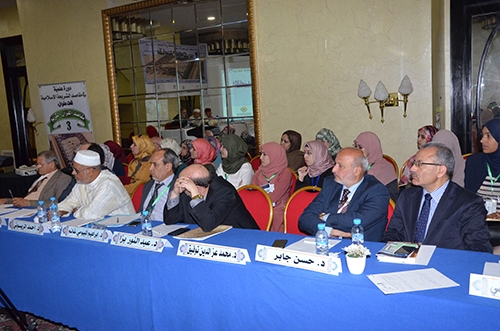
Professor Hassan Azral commented on the submission. He posed the question: is the completion and perfection of religion a matter related to us, or is it outside our will? He dwelt on some ideas mentioned in the paper, such as the problematic issues of: religion divorced of action, being immobilised by the divine miracle (of action, being immobilised by the divine miracle (of: religion divorced of action, being immobilised by the divine miracle (al-i‘jāz), and also unfinished work. He mentioned that the Companions’ reading of the Qur’ān was that of striving to the utmost for God’s sake, and so theirs was a correct reading.
The session concluded with a number of submissions, discussions, and commentaries.
The second day of the course, Wednesday 10 May, started with the third session, chaired by Dr Moustafa Murabit. The first paper, “The family in the Qur’ān: from human being to urbanisation” was delivered by Dr Jamilah Tilout. She began by explaining the fundamental concepts regarding the family from lexicological and terminological perspectives. She dwelt on the defining elements of the family in the Qur’ān. Further, she emphasised that it revolved around the moral-ethical progression from spouses on to the polar (central) Ummah. She then explained the concept of urbanisation (al-‘umrān) in the Qur’ān, linking this to the family and its role in achieving the desired civilisational urbanisation. She asserted that the jurisprudence of urbanisation combines both jurisprudences of text (al-naṣ) and reality (al-waqi‘). She then addressed the matter of the relationship between the family and the protection of the human being, beginning with preservation of formation and biology by way of preserving lineage and species; moral preservation through purification; and preservation of identity through preservation of lineage. She then pointed to some of the objectives related to conjugal union in terms of inner peace, moral protection, chastity, mutual care, and others. She concluded with the objectives that preserve human social union towards protection of the innate, and mutual compassion, which preserves family, human being, and social unions.
Dr Wafa Toufiq then commented on this paper, highlighting the novelty within, and adding a set of ideas to the submission. She also presented a number of observations, starting with the study design, as well as criticising the inclusion of child adoption under protection of the human being; she outlined the specific objectives relating to adoption. She recommended the addition of further depth to the third chapter, as well as adding new objectives.
Dr Muhammad al-Nouri delivered the second paper of the session, titled “The economic objectives in the Noble Qur’ān”. In his paper, he indicated the relationship between objectives and economics. He summarised the objectives of the empirical discipline of economics in the diagnosis and treatment of the economic problem, and achieving economic growth, balance, stability, and justice. He mentioned some of the economic objectives found within the Noble Qur’ān, such as: urbanisation, empowerment, security, balance, and justice.
Dr Abdelsalam Ballaji commented on this paper by posing the question: are resources scarce or available? He also emphasised that the monetary and financial domain is one of ritual worship, based on the achievement of the principle of viceregency. He mentioned a set of economic objectives, including justice, income, work, creating future wealth, wealth conservation, purification of wealth, spending only when justified, consumption, growth, financial and value flows, etc.
The fourth session began following the discussion, and was chaired by Dr Noureddine al-Khademi. This began with Dr Ahmed Kafi’s paper, titled “The intellectual objectives of the Noble Qur’ān”. He initially emphasised that all human and religious values are elaborated by the intellect, as the initiation of will and action. Moreover, thinking is one of the Qur’ān’s objectives. He studied the concept and semantics of thinking in the Qur’ān. He then moved to elucidate some of the objectives of thinking in the Qur’ān. These include: the objective of explanation that entails clarification and eradicating deviances in this life, and rituals rejected in Islamic legislation, the objective of eradicating group thought, freedom from group control and authority, or liberating the individual’s decision from the pressure of the group.
Dr Ibrahim Bourshashen commented on the paper, asking: What is the methodology for such thinking? He also stopped at the problematic issue of the concept of group (al-jamā‘ah), the majority (al-jamhūr), and the Ummah. He posed a series of questions relating to thinking linked to actuality. He asked: How can we think today on creed (‘aqīdah)? How can we think about forging the new human? How do we think today on financial transactions?
The fifth session chaired by Professor Hasan Jabir began after the discussion. Dr Abdelnour Bazza presented his paper, “Edification objectives in the Noble Qur’ān”. He explained the concept of edification (tarbiyyah) in language, terminology and Qur’ān. He emphasised that the essence of the Qur’ān was to edify the human being. He then moved on to explain some edification objectives, asserting that these are quite numerous. These include: the objective of imparting learning, where he discussed the related ruling on whether it is obligatory on everyone, or some only; then the objective of ethics, discussing the material essence of ethics; and the objective of ritual worship, distinguishing between private and public ritual worship.
Professor Abdelfattah al-Zineifi commented on the paper. He asked about the state of education today, and the extent it achieved the objectives of worship, ethics, and knowledge. He also asserted that in its entirety, the Qur’ān is a book of edification.
Professor Izzedine Toufiq delivered the second paper in this session titled “The Noble Qur’ān’s invitation to the human being to reflect on himself: knowledge and practice objectives”. He started by highlighting that God, the Almighty, commanded every human being to look and reflect on himself, and his surroundings. He then dwelt upon the matter of reflection within the Qur’ān. He t moved to explaining some of the objectives related to the invitation in the Qur’ān to the human being to reflect upon himself, including the practical objectives of thinking about the self. He differentiated between thinking and reflection, considering that thinking is the gateway to reflection. Moreover, thinking is common to all people while reflection is particular to only some. He stopped at the objectives of belief in the unseen (al-ghayb), the Last Day, and true faith. He then moved on to the practical objectives of reflecting upon the self, including: the objective of the human being’s function in creation, and the objective of inserting worship in life, repentance and others. He emphasised that the human being is multifaceted, in his biological and psychological aspects, where each possesses his own objectives.
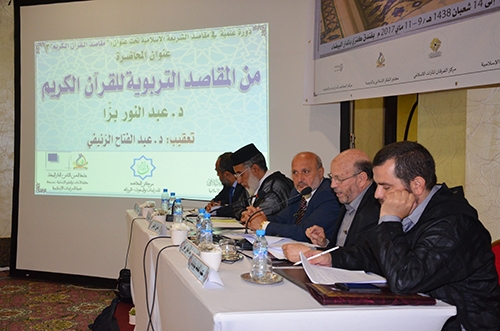
Dr Abdelsamad Boudhiab commented on the topic, emphasising its importance, benefit, and relationship to the training course topic. He also provided a set of methodological suggestions in order to grant greater depth to the topic.
The proceedings of the second day of the training course concluded with discussion and comments from the audience, who engaged with the papers and commentaries.
The sixth session of the training course was chaired by Professor Mohamed Salim El-Awa. This opened with a paper by Professor Abdul Majid al-Najjar, “The objectives of the Noble Qur’ān in securing the practice of consultation (al-shūrā)”. He highlighted that the Qur’ān did not codify consultation as a legislative reality and then was silent; rather, it was articulated as a practical and methodological reality. In order to assist us in the application of consultation in life, it provided us with a methodology for implementation, enabling us to practice it. He then detailed a Qur’ānic mapping of the spheres, where consultation is applied. These included family, society, and politics. He then moved to elucidate some of the Qur’ānic approaches to secure consultation, such as commitment in the innate, faith, and legislation, as well as the obligation of edification, proselytising, and others. At the conclusion of the paper, he called for the necessity of conducting social education around consultation, and reforming education, such that it is built upon dialogue and consultation.
Professor Moulay al-Moustafa al-Hind commented on the paper, praising the content and composition. He then dwelt on the practice of consultation, clarifying that it had been taken out of the context of the general Qur’ānic meaning in Islamic culture, and limited to the political aspect. He connected consultation to the Qur’ānic conceptualisation of viceregency, and considered it a comprehensive and general objective, as it represented a framework for human social life.
Subsequently, the paper “Thematic exegesis and objectives of the Noble Qur’ān” by Professor Hasan Farhat was delivered on his behalf by Professor Omar Jaddiyya. He presented the relationship of thematic exegesis to the objectives of the Qur’ān. He noted that thematic exegesis, as a somewhat contemporary science, was of two types; one, a discipline relating to meanings, and the other relating to terminology. He also dwelt upon the origins of thematic exegesis in the works of past and contemporary scholars. He further elucidated the influence of thematic exegesis in the clarification of the Qur’ān’s objectives; for example, gathering disparate verses in the Qur’ān, which share a common theme to be considered as one collective unit, so as to understand the dimensions and effective elements of Qur’ānic guidance; moreover, facilitating the path to knowledge, and revealing the true correspondence linking these verses; in addition, revealing some aspects of miracle in the Qur’ān. The paper provided illustrative examples of thematic exegesis.
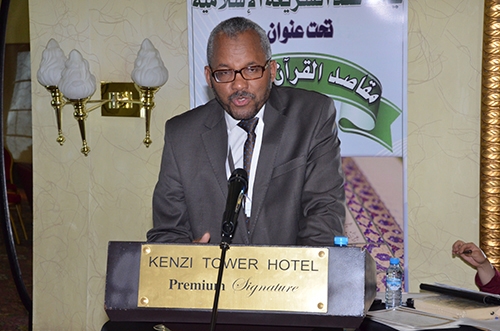
Professor Omar Jaddiyya commented on the paper by outlining its benefits and highlights, while underlining qualities and priceless gems from works of past scholars. However, he presented a set of criticisms of the paper, including the need to link thematic exegesis with exegesis of the Qur’ān through the Qur’ān itself.
The opportunity was opened for the audience to participate through discussion, commentary, and questions.
The sixth session, chaired by Dr Abdelrahman al-Kaylani, centred on the paper by Professor Ahmed al-Raissouni titled “The objectives of verses between generality of words and specificity of cause”. He explained his intent behind “objectives” and the relationship to cause. He mentioned the disagreement among scholars in their saying that knowledge of cause leads to knowledge of the Causer, and the statement “consideration to generality of words not specificity of cause”. He questioned: when are the reasons for revelation in the service of the Qur’ān? And when are they a danger to it? Professor al-Raissouni discussed a set of questions, including the scholars’ statement: “consideration to generality of words not specificity of cause” and its applications. He addressed the relationship between generality of words and the generality of objective to highlight the benefits of reasons for revelation. He also linked objectives to the study of semantics by legal theorists (al-uṣūliyyūn). He emphasised the need to treat these and other legal theory works with the spirit of objectives, so as to overcome the superficial approach.
Professor Abdul Majid al-Najjar commented on this paper, and emphasised the need to critically investigate the meaning “generality of term”, which lies within the lexicological meaning. He questioned the extent to which the rule, “consideration to generality of words not specificity of cause”, is applicable. He also proposed a number of research projects related to the topic.
Following the discussion, the seventh session began, chaired by Professor Ahmed al-Raissouni. This was taken fully by Professor Mohamed Salim El-Awa’s paper, titled “Verse endings and the objectives of the Noble Qur’ān: Surah al-Ra‘d as an example”. With verse endings, he meant those universal, comprehensive phrases that concluded the majority of the Qur’ān’s verses. These may also be an independent verse. He mentioned that he selected Surah al-Ra‘d, because it is a Surah revealed in the Makkan period, whose verses are considered to be universal. Therefore, he emphasised that attention to objectives was revealed quite early in the Qur’ān in the Makkan period. He dwelt on a set of verse endings to clarify their objectives.
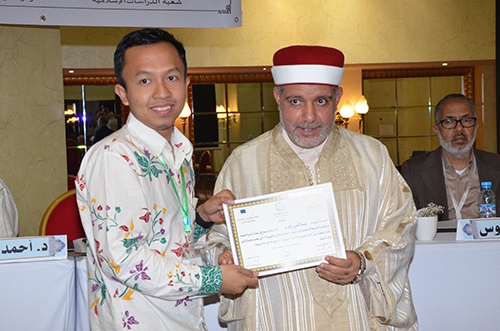
Professor Ahmed al-Raissouni presided over the closing session, which included a number of speeches, such as Professor Hussain al-Mous for the Maqāṣid Research & Studies Centre, Professor Mohammed Izzedine Toufiq, Head of the Islamic Studies Department - Ben M'sik, and Mohammed Drioueche for Al-Furqān Islamic Heritage Foundation. In addition, Professor Noureddine al-Khadimi spoke on behalf of the lecturers, followed by a speech by the organising committee, read out by Dr Hassan al-Sarrat. Then, Dr Jamilah Tilout read out the recommendations, including:
● Dedicating the forthcoming training course to the objectives of the Noble Prophetic tradition (Sunnah).
● Working to formulate practical proposals for the application of the objectives of Qur’ān.
● Peer reviewing the commentary, such that it is to be the desired level.
● Collecting the papers of the three training courses in one thematically ordered encyclopaedia, while filling any gaps in any domain through independent researches.
● Paying attention to the organisation of workshops, in order to formulate plans for the implementation of Qur’ānic objectives.
● Proposing scientific projects to harness the participation of delegates benefiting from the training courses in the investigation into objectives.
● Organising training courses and symposia in specialist domains, such as the objectives of creed, family, dealings, edification, Islamic politics, governance and policy, etc.
● Opening up to the University, by holding open symposia to widen the scope of beneficiaries.
● Presenting suggestions for research by masters and doctoral students, in order to widen the circle of research and engagement.
● Setting aside one of the training course days to be held at the University, in order to open up to students, and grant an opportunity for the greatest number to benefit from the expertise of scholars and researchers.
● Developing a model curriculum on Qur’ān and Islamic law objectives.
● Operationalising objectives in reformulating studies on legal theory.
● Working towards operationalising objectives in both theory and practice, and providing scientific proposals for the introduction of objectives into humanities and social sciences.
The course proceedings concluded on Thursday evening, 11 May, with the distribution of certificates to participants.


